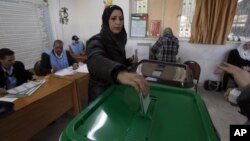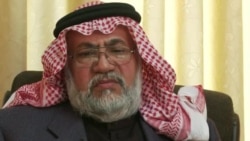CAIRO —
Jordanians are voting for a new parliament Wednesday at a time of growing calls for reform in the kingdom.
However, the influential Muslim Brotherhood is boycotting the vote, casting doubt on how influential the body will be.
The brotherhood's political wing, the Islamic Action Front, has been at the front of calls for reform in the kingdom.
But Prime Minister Abdullah Ensour, casting his ballot Wednesday, said change would go ahead.
"I am very sure that the Jordanian people are confident that we started from today a new era of political reform," he said.
The prime minister characterized the vote as “clean.”
Foreign election observers reported seeing minor violations, such as campaigning at the polling stations, but overall the process appeared to be going smoothly.
More than 1,400 candidates are competing for 108 individual seats and 27 reserved for candidates from national party lists. An additional 15 seats are reserved for female politicians.
The Islamic Action Front objects to the emphasis on individual races rather than party lists, a system that favors tribal and rural connections, often pro-government, over the more urban base of the brotherhood.
But in discussing strategy in the months leading up to the vote, the Front's Deputy General Secretary Nimer al Assaf said the bigger point was the potential for democratic change in a country where the king ultimately holds all power.
"Parliament really cannot enforce any constitutional reforms, so it is pointless talking about going to parliament to change things,” al Assaf said.
Islamists largely boycotted Jordan's last elections, in 2010.
Watch video of Nimer al Assaf, deputy general secretary, Islamic Action Front
Security was beefed up across the country Wednesday, with tens of thousands of security and police personnel deployed. Calls for reform have brought out protesters in Jordan since uprisings in neighboring countries began two years ago, but in far smaller numbers and for the most part peaceful.
Unlike the Muslim Brotherhood and other Islamists in Egypt and Tunisia, who were under assault by the now-ousted secular leaders, Jordan's Islamists have worked with the Hashemite monarchy over the decades.
Islamist leaders stress they do not want King Abdullah overthrown, but want constitutional reforms leading to a more representative government.
However, the influential Muslim Brotherhood is boycotting the vote, casting doubt on how influential the body will be.
The brotherhood's political wing, the Islamic Action Front, has been at the front of calls for reform in the kingdom.
But Prime Minister Abdullah Ensour, casting his ballot Wednesday, said change would go ahead.
"I am very sure that the Jordanian people are confident that we started from today a new era of political reform," he said.
The prime minister characterized the vote as “clean.”
Foreign election observers reported seeing minor violations, such as campaigning at the polling stations, but overall the process appeared to be going smoothly.
More than 1,400 candidates are competing for 108 individual seats and 27 reserved for candidates from national party lists. An additional 15 seats are reserved for female politicians.
The Islamic Action Front objects to the emphasis on individual races rather than party lists, a system that favors tribal and rural connections, often pro-government, over the more urban base of the brotherhood.
But in discussing strategy in the months leading up to the vote, the Front's Deputy General Secretary Nimer al Assaf said the bigger point was the potential for democratic change in a country where the king ultimately holds all power.
"Parliament really cannot enforce any constitutional reforms, so it is pointless talking about going to parliament to change things,” al Assaf said.
Islamists largely boycotted Jordan's last elections, in 2010.
Watch video of Nimer al Assaf, deputy general secretary, Islamic Action Front
Security was beefed up across the country Wednesday, with tens of thousands of security and police personnel deployed. Calls for reform have brought out protesters in Jordan since uprisings in neighboring countries began two years ago, but in far smaller numbers and for the most part peaceful.
Unlike the Muslim Brotherhood and other Islamists in Egypt and Tunisia, who were under assault by the now-ousted secular leaders, Jordan's Islamists have worked with the Hashemite monarchy over the decades.
Islamist leaders stress they do not want King Abdullah overthrown, but want constitutional reforms leading to a more representative government.







